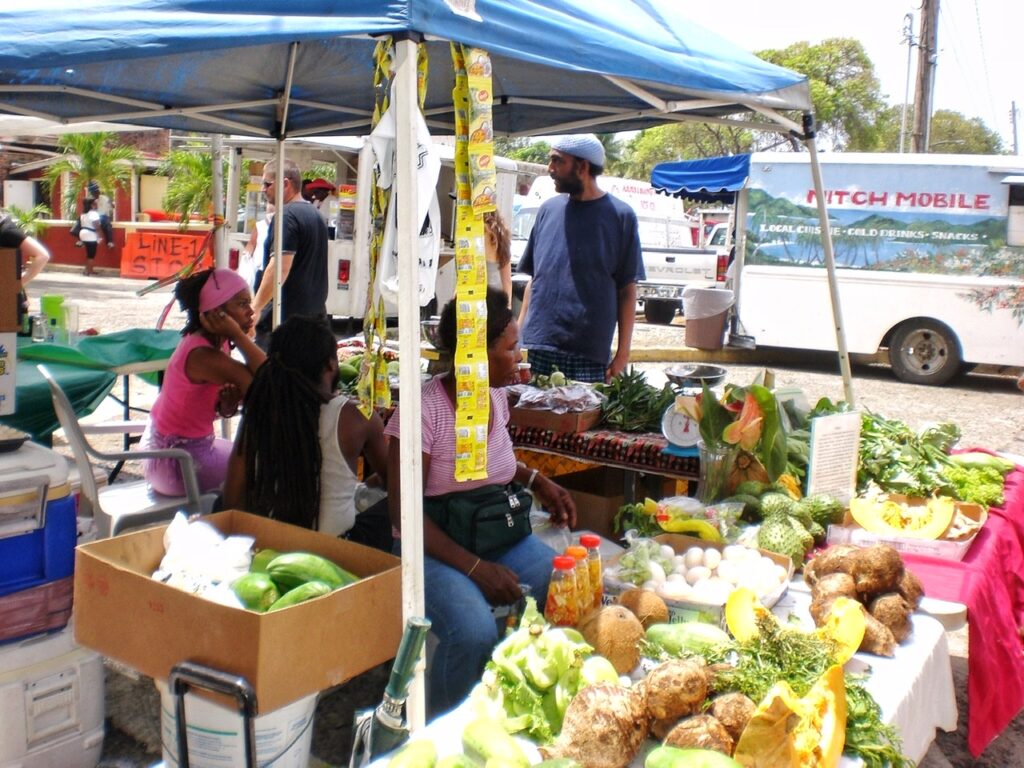CHARLOTTE AMALIE — According to the Bureau of Labor Statistics, within the first decade of a small business’s lifespan, there comes a time when financial survival looks bleak.
For local farmers’ markets, that time seemed likely to occur in the spring of 2020 when public safety guidelines limited the number of customers in market locations.
With 98 percent of its food supply dependent on imports, St. Thomas relies on its local farmers’ markets to revitalize the agricultural economy and distribute healthy, locally-sourced food to people of all income levels.

New Ways to Distribute Produce
The challenges faced by farmers’ markets throughout these difficult times do not mean that each town’s favorite shopping center is as good as gone. In the U.S. Virgin Islands (USVI), farmers’ markets are forging new ways to distribute produce to consumers during the year’s most fruitful growing season. Local farmers’ markets in the U.S. Virgin Islands are registering their products under an online database called the St. Thomas Locally Grown Online Farmers’ Market, an initiative aimed at supporting local farmers.
Like other markets, customers can choose exactly which products they’d like to purchase from each grower. Unlike other markets, they can do it all from the comfort of their own homes. “We started to expand the market from St. Croix’s community to St. Thomas after the 2017 hurricanes,” says market owner Shelli Brin in an interview with The Borgen Project. “So this particular market wasn’t going on in response to the pandemic.”

The Convenience of Online Farmers’ Markets
Planned or not, digitalizing the process of product selection has turned out to be a strategic move for local farmers’ markets in the U.S. Virgin Islands. Brin reports that the virtual approach makes it easier for beginners to start their businesses with customers likely preferring the social distancing afforded by an online market. As an extra precaution, the farmers’ markets also installed a drive-through style delivery. But, the advantages of the online approach don’t end there.
Not only do such local farmers’ markets in the U.S. Virgin Islands increase shopping efficiency but they also financially support farmers and bolster the local economy. Data from the Farmer’s Market Coalition reveals that American farmers take home less than 20% of each dollar spent on their products at a supermarket. However, at farmers’ markets, they receive on average 90% of each dollar. Economist Ken Meter tells the Farmer’s Market Coalition that farmers’ markets can also afford to fit prices to consumer needs during economic crises, unlike their supermarket counterparts.
One reason for such price flexibility is the short distance between local farmers’ growing and selling sites. To reach local farmers’ markets, over 50% of American farmers traveled less than 10 miles. Such a decreased commute both saves local farmers the heavy expenses of long-distance shipping, which the Soy Transportation Coalition (STC) claims are disproportionately absorbed by farmers and reduces air pollution.
Boosting the Local Economy
Following close to the individual success of farmers are improvements in the local economy. According to the Farmer’s Market Coalition, for every $1 million earned by farmers’ markets, 32 new jobs are created in the USVI. Conversely, only 10 jobs are created for every million spent on imported food products. Encouraging consumers to buy locally also increases revenue for small businesses by lowering the cost of raw materials. Together with business revenue, attempts to increase the number of local fruit orchards in the USVI may grow revenues and taxes by as much as one million dollars annually.
Community Supported Agriculture
Enhancing local economic growth isn’t farmers’ markets only weapon against recent challenges. Some local farmers’ markets in the U.S. Virgin Islands are also making use of the Community Supported Agriculture (CSA) program. CSA is a popular concept that allows members (including users of SNAP/Food Stamps) to buy a weekly share of a small farm’s produce. Brin and her team were the first to bring CSA to the USVI where it has since been picked up by supermarkets and is manifest in many subscription plans for boxed groceries. Markets are implementing the USDA’s Electronic Benefits Transfer (EBT) program, an electronic system that enables users to pay retailers by transferring their government benefits.
Shopping at a local farmer’s market is best for the economy and the farmers. “To this day, many people don’t know where our sugar comes from. We actually don’t know!” says Brin. As consumers, we need to be more cognizant about how and where our food comes from both to ensure that we consume healthy products and that the farmers behind those products are being treated justly and with respect.”
Challenges for Farmers
Unfortunately, gaining access to grants and technology like EBT isn’t a walk in the park for many local farmers’ markets in the U.S. Virgin Islands. Brin says that her market’s EBT machine has broken down twice to date and has yet to be repaired. In general, the USVI’s participation in the federal government’s agriculture programs isn’t robust. For example, the Sustainable Agriculture Research and Extension (SARE) program was designed to engage farmers in agricultural research. However, It awarded only eight grants to farmers in the USVI between 1988 and 2017. Further, the USDA’s Beginner Farmer and Rancher Development Program has only ever funded one program based in a U.S. Territory.
Moving Forward
Ultimately, it’s such struggles (coupled with Hurricanes Irma and Maria’s damage to agriculture in 2017), that make local farmers’ markets in the U.S. Virgin Islands a testament to the region’s resilience, Brin. said to The Borgen Project. Even during times of global pandemic, local farmers’ markets are finding ways to adapt. Moving forward, the St. Thomas Locally Grown Online Farmers’ Market is looking to install a cash-free payment option and home delivery in addition to promoting the CSA program that motivates communities to learn about their food production.
By Petra Dujmic of BORGEN MAGAZINE
